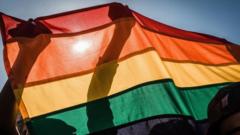The World Bank has announced it will resume lending to Uganda, ending a two-year ban that was initially imposed following the passage of severe anti-LGBTQ laws in the country. In 2023, Uganda enacted the Anti-Homosexuality Act, one of the strictest laws globally, which includes provisions that could impose the death penalty for specific same-sex acts.
The repercussions of this legislation have been dire, with reports from Uganda's Human Rights Awareness and Promotion Forum indicating that countless individuals have been subjected to violence, evictions, and arrests based on their sexual orientation. In light of these events, the World Bank has asserted that it will implement "mitigation measures" intended to ensure that its funding does not adversely affect LGBTQ individuals.
A spokesperson for the World Bank commented on the necessity of inclusive participation in projects funded by the institution, stating, "The World Bank cannot deliver on its mission to end poverty and boost shared prosperity unless all people can participate." The organization has reportedly collaborated with the Ugandan government and various stakeholders to introduce anti-discrimination measures tied to the new funding initiatives.
The World Bank's investments, which are crucial for Uganda’s infrastructure, including road enhancements and improved electricity access, have faced scrutiny from some economists who argue that the funding model fosters dependency and fails to promote sustainable growth through stringent loan conditions.
Uganda's legislative actions against its LGBTQ community have drawn international criticism, resulting in estimated economic losses between $470 million and $1.7 billion due to halted financing since the anti-gay law's introduction. While government officials claim the law aligns with the cultural values of Ugandans, detractors argue it distracts from pressing issues like unemployment and governance.
As the situation evolves, the implications of the World Bank's funding decision continue to unfold, particularly for vulnerable segments of Ugandan society. Activists warn that such legislation acts as both a catalyst for violence against LGBTQ individuals and a tool for stifling dissent against a government that seeks to reinforce traditional values amidst broader societal challenges.
The repercussions of this legislation have been dire, with reports from Uganda's Human Rights Awareness and Promotion Forum indicating that countless individuals have been subjected to violence, evictions, and arrests based on their sexual orientation. In light of these events, the World Bank has asserted that it will implement "mitigation measures" intended to ensure that its funding does not adversely affect LGBTQ individuals.
A spokesperson for the World Bank commented on the necessity of inclusive participation in projects funded by the institution, stating, "The World Bank cannot deliver on its mission to end poverty and boost shared prosperity unless all people can participate." The organization has reportedly collaborated with the Ugandan government and various stakeholders to introduce anti-discrimination measures tied to the new funding initiatives.
The World Bank's investments, which are crucial for Uganda’s infrastructure, including road enhancements and improved electricity access, have faced scrutiny from some economists who argue that the funding model fosters dependency and fails to promote sustainable growth through stringent loan conditions.
Uganda's legislative actions against its LGBTQ community have drawn international criticism, resulting in estimated economic losses between $470 million and $1.7 billion due to halted financing since the anti-gay law's introduction. While government officials claim the law aligns with the cultural values of Ugandans, detractors argue it distracts from pressing issues like unemployment and governance.
As the situation evolves, the implications of the World Bank's funding decision continue to unfold, particularly for vulnerable segments of Ugandan society. Activists warn that such legislation acts as both a catalyst for violence against LGBTQ individuals and a tool for stifling dissent against a government that seeks to reinforce traditional values amidst broader societal challenges.



















